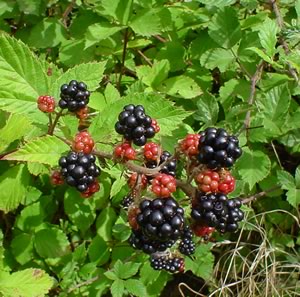
Rubus is a large and diverse genus of flowering plants in the rose family, Rosaceae, subfamily Rosoideae, with 250–700 species.

Rubus parviflorus, commonly called thimbleberry, is a species of Rubus native to northern temperate regions of North America. It bears edible red fruit similar in appearance to a raspberry, but shorter, almost hemispherical. Because the fruit does not hold together well, it has not been commercially developed for the retail berry market, but is cultivated for landscapes. The plant has large hairy leaves and no thorns.
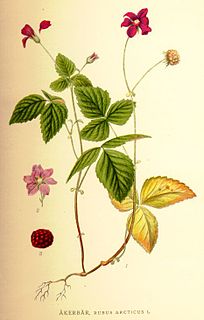
Rubus arcticus, the Arctic bramble or Arctic raspberry, is a species of slow-growing bramble belonging to the rose family, found in arctic and alpine regions in the Northern Hemisphere.

Rubus leucodermis, also called whitebark raspberry, blackcap raspberry or blue raspberry, is a species of Rubus native to western North America, from Alaska south as far as California, Arizona, New Mexico, and Chihuahua.

Eriophyllum, commonly known as the woolly sunflower, is a North American genus of plants in the sunflower family. The genus is native to western North America, with a concentration of narrow endemics in California.

Zinnia acerosa is a low-growing perennial flowering plant native to the Southwestern United States and Northern Mexico. Common names include desert zinnia, wild zinnia, white zinnia, and spinyleaf zinnia. It is a popular landscape plant in the southwest due to its low water use and long bloom period. The flowers also serve as a food source for southwestern butterflies.

Cirsium arizonicum, the Arizona thistle, is a North American species of thistle in the sunflower family, native to the southwestern United States and northwestern Mexico. It has been found in Arizona, southeastern California, New Mexico, Nevada, Colorado, Utah, Sonora, and northwestern Chihuahua.
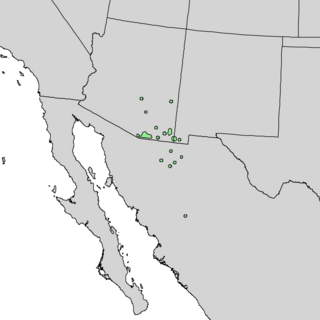
Quercus toumeyi is a North American a species of tree in the beech family. It is found in northwestern Mexico and the southwestern United States. It grows in Sonora, Chihuahua, Arizona, New Mexico, and the extreme westernmost tip of Texas.
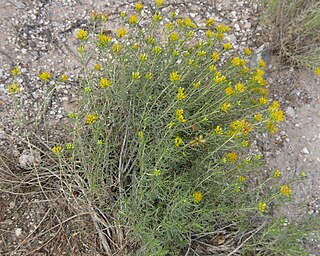
Isocoma pluriflora, commonly called southern jimmyweed or southern goldenbush, is a North American species of flowering perennial herbs in the sunflower family. It grows in northern Mexico and in the southwestern and south-central United States.
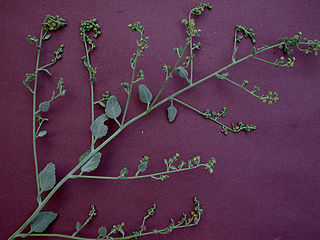
Dicoria canescens is a North American flowering plant in the daisy family known by several common names including desert twinbugs and bugseed. This is a desert plant of the southwestern United States and northwestern Mexico, found in Sonora, Baja California, southern California, Nevada, Arizona, Utah, southwestern Colorado, and northwestern New Mexico.

Cirsium neomexicanum is a North American species of thistle known by the common names New Mexico thistle, powderpuff thistle, lavender thistle, foss thistle and desert thistle.

Ericameria cuneata is a species of flowering shrub in the daisy family known by the common name cliff goldenbush. This plant is native to the southwestern United States and northwestern Mexico.

Isocoma acradenia is a North American species of flowering plant in the daisy family known by the common name alkali goldenbush.

Baccharis brachyphylla is a North American species of shrub in the daisy family, known by the common name shortleaf baccharis or false willow. It is native to the southwestern United States and northern Mexico. It grows in desert habitats such as arroyos and canyons.

Rubus pubescens is a herbaceous perennial widespread across much of Canada and the northern United States, from Alaska to Newfoundland, south as far as Oregon, Colorado, and West Virginia.

Rubus illecebrosus is a red-fruited species of Rubus that originally came from Japan, but is also very popular in some European countries like Lithuania. Common names include balloon berry and strawberry raspberry. It has become sparingly naturalized in scattered locations in Canada, the United States, and South America.
Brickellia baccharidea is a North American species of shrubs in the sunflower family. It is native to the southwestern United States ane northwestern Mexico.
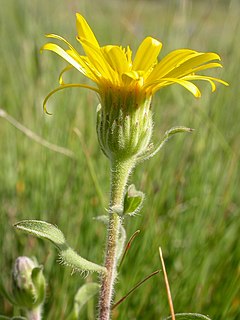
Heterotheca villosa, called the hairy goldenaster, is a North American species of flowering plant in the aster family. It widespread across the central and western parts of the continent, from Ontario west to British Columbia and south as far as Illinois, Kansas, Nuevo León, Guanajuato, and northern Baja California.
Hymenopappus flavescens, the collegeflower, is a North American species of flowering plant in the daisy family.
Rubus arizonensis, called Arizona dewberry, is an uncommon North American species of flowering plant in the rose family. It is found in northwestern Mexico (Sonora) in the southeastern United States.
















